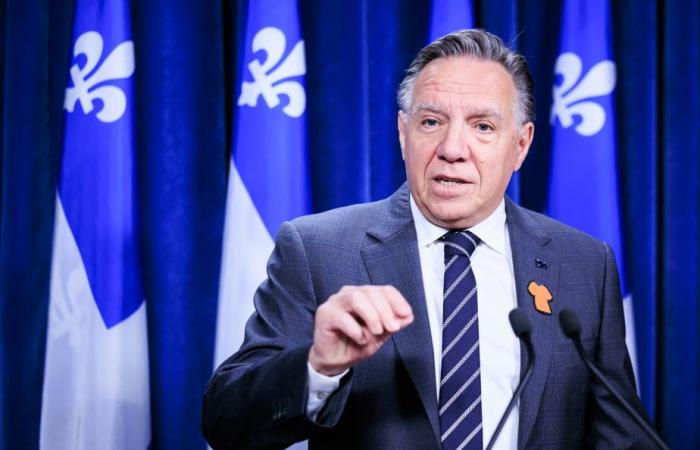
(Paris and Ottawa) Prime Minister François Legault asks his counterpart Justin Trudeau to create “waiting zones” for asylum seekers in order to reduce pressure on Quebec and distribute them to other provinces. The model exists in France, he insisted on mission to Paris on Tuesday. To which Federal Minister of Immigration Marc Miller responds that Canada is not France.
Published at 11:38 a.m.
Updated at 2:27 p.m.
“What we asked of Ottawa is: take inspiration from France, among others,” said the Prime Minister during a press scrum.
“Currently, we have 160,000 asylum applications. We have housing problems, we lack teachers and nurses. And more than a third, I think 40% of asylum seekers do not speak French and settle in Montreal, and there is already a decline in French in Montreal. So is there any possibility of moving them to other areas? And there are the next ones coming too. Currently, there are no major changes announced by Mr. Trudeau for asylum seekers. »
A waiting zone could be created near the Montreal-Trudeau airport and in other provinces. It would be necessary to determine how long an asylum seeker should stay in such an area where he is housed and fed while his case is studied. The duration cannot exceed 26 days in France.
Ministers Jean-François Roberge (Canadian Relations) and Christine Fréchette (who is no longer at Immigration today) wrote on July 22 to their counterparts Dominic Leblanc and Marc Miller to ask them to create such zones of waiting. “In order to ensure a fair distribution of asylum seekers across the country, we believe that your government should establish and coordinate a pan-Canadian temporary accommodation network. Quotas of places would be determined by your government for each province and territory, based on their respective demographic weight,” we can read.
“There are already centers that exist, in Ontario in particular, and what we think is that greater use, similar to what France is doing, could be studied at the very least,” explained Tuesday Minister Roberge. “I don’t think we are in a situation where we can dismiss options out of hand,” added the Minister of Immigration.
“Asylum seekers would be directed to these places of temporary accommodation based on a range of factors, including their language skills as well as the presence of members of their direct family in a given province or territory. This system would make it possible to welcome asylum seekers with dignity and ensure that they can contribute to the economic vitality of all regions of Canada. This would also make it possible to alleviate the pressure that provinces already receiving a large number of asylum seekers, such as Quebec and Ontario, are experiencing, and would prevent these people from systematically heading towards the metropolitan regions of Montreal and Toronto. . According to this system, if asylum seekers choose to settle in a location other than that allocated by the federal government, they will have to assume the costs of their accommodation upon arrival. »
The ministers add that “the possibility of imposing a geographical limitation on their work permit should also be considered. »
“Thus, upon arrival in Canada, the applicant would be informed that the territorial scope of their work permit will be limited to the province or territory in which they have been allocated a temporary accommodation place, and this, until until a favorable decision is rendered by the Immigration and Refugee Board of Canada,” they explain.
According to them, it is “essential” that Ottawa “quickly sets up such transitional infrastructure across Canada which it would manage”. They argue that “several states, which are parties to the same international conventions as Canada, have set up such sites through which asylum seekers must pass as soon as they arrive on the territory. This is particularly the case in France, where asylum seekers arriving at the airport are first subject to a restriction measure and are housed in a waiting area near the airport, before beginning the asylum application process.
Last week, François Legault met President Emmanuel Macron in Montreal. The latter told him that the processing time for asylum seekers’ files since he took office has increased from three and a half years to four months. “He told me: I’m not satisfied with that, I want it to be reduced to two months. In Quebec, we are three years away! » said Mr. Legault.
Quebec will table its bill this week to reduce the number of foreign students in Quebec. There are 120,000 of them at the moment. The legislative text will allow the government to impose a maximum number of foreign students in professional training, in CEGEPs and universities. “We have not yet reached the point of giving the number for each establishment,” said Mr. Legault, adding that the subject will be the subject of discussions.
“A certain tone from the right”
Upon leaving the Cabinet meeting on Tuesday, Minister of Immigration, Citizenship and Refugees Marc Miller did not want to expand on the subject, arguing that the proposal from Quebec was vague. However, he mentioned a project “potentially contrary to the Charter”.
However, he did not hold back from criticizing what he described as a “desperate attempt” by the Legault government to “brandish as a scarecrow”, once again, the issue of asylum seekers for political ends.
“It seems to me that it is a certain right-wing tone that we see more and more in certain countries that Mr. Legault is trying to adopt,” he said in the press scrum. We should look at what Mr. Legault is proposing, but it seems to me […] something which is not the most humanitarian. »
And moreover, the challenges facing Canada are not the same as those of France, argued Minister Miller. “We are not France […] We don’t have people arriving by boat, by train, and we don’t have borders as permeable as those of France,” he insisted.
This is an “uncomfortable parallel”, he lamented, ensuring that the project had never been mentioned during his discussions with his former Quebec counterpart Christine Fréchette or her successor, Jean -François Roberge.
What they said
The details should be explored. What concerns me is that we must act humanely with asylum seekers. To the extent that […] the two levels of government can talk to each other and stop arguing over the visit […] for immigration control, we are not closed.
Marc Tanguay, interim leader of the Quebec Liberal Party
There is already temporary accommodation for people who arrive on Quebec territory and apply for refugee status. What will always be important to us at Québec solidaire is that human dignity is preserved. […] In conclusion, we just have to remember that, all things considered, the situation in France and then the situation in Quebec, in terms of the quantity of people, really has nothing to do with that, nothing to do with it.
Gabriel Nadeau-Dubois, parliamentary leader of Québec solidaire
If the government wants to move towards this, we will be asked to look at this very carefully, because there may also be risks of it becoming facilities that are not appropriate for the dignity of people who are not criminals, but who are people looking for a better life.
Pascal Paradis, member of the Parti Québécois
With Fanny Léand you The Pressin Quebec





